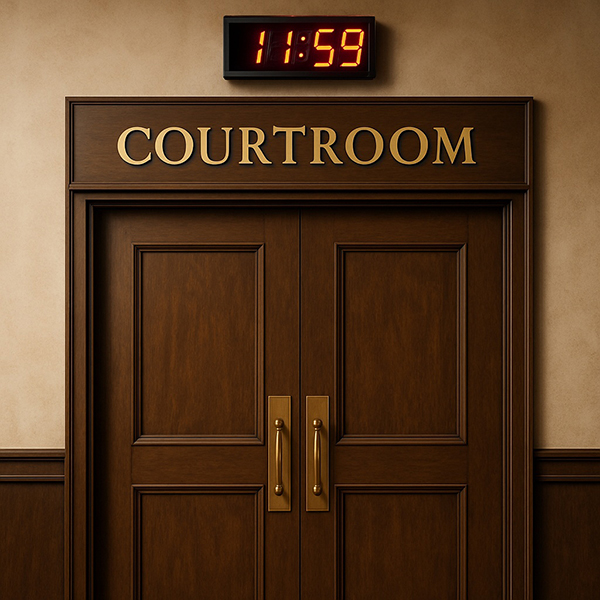Law Practice,
Civil Litigation
Oct. 27, 2025
Last-minute settlements: How trial preparation gives you leverage
Trial preparation isn't wasted when cases settle at the last minute -- it's exactly what forces those settlements to happen.




Brigitta S. Cymerint
Attorney
Panish Shea Ravipudi LLP
Phone: (310) 689-7777
Email: brigittacym@gmail.com

In my first year as a personal injury lawyer, I helped prepare nine cases for trial. Every single one settled -- some the week before, some the night before, and one literally on the courthouse steps.
You spend months getting ready: organizing exhibits, preparing witnesses, drafting motions, rehearsing openings. You live and breathe that case for weeks, and then, right when you're about to step into court, you get the call. It is an odd mix of relief, exhaustion and a little disappointment. You never get to show what you prepared, but over time, you realize something important: those settlements didn't happen despite your trial prep, they happened because of it.
Most cases resolve at the eleventh hour for one simple reason: trial readiness gives you leverage. The closer you get to trial, the more pressure builds on the defense. Insurance carriers and defense firms wait to see if you will actually show up ready to pick a jury. Many lawyers talk about being "trial ready," but few actually are. Once you start filing motions in limine, confirming witnesses, and organizing your exhibits, they know you are not bluffing.
Even the simple act of filing pretrial documents on time sends a signal. The small things do add up to leverage. Be sure to check your local court rules; they often have specific formatting, exhibit labeling, or meet-and-confer requirements that are unique to different courts.
Part of it is human nature; people procrastinate. Trials are expensive, unpredictable and stressful for everyone involved. Adjusters often do not have full authority to settle until a case reaches the "trial posture" stage. The pressure to resolve becomes real only when you've made it clear you are ready to walk into court.
A good example is Cedric Taite v. Omar Penaloza and J.J.
Associates, Inc., a case we prepared for trial this year (featured
here). The trial had been continued several times because defense counsel
was not ready; they hadn't even deposed the plaintiff and had done very little
to move the case toward trial. One week before the scheduled start date, we
sent a demand for the full $3 million policy limits. In that letter, we laid
out the procedural history, the defense's lack of trial preparation and the
exposure created by open policy limits. We made it clear we were ready and
confident a jury would find in our client's favor. This demonstration of readiness
created leverage. The insurance company finally saw the liability, injuries and
damages for what they were, and understood that the trial date was real. The
case settled on the last day for the full $3 million policy.
For new attorneys, this is the hidden lesson: trial preparation is never wasted time. Every hour you spend preparing deepens your understanding of the case. You start to see the case differently, not as a stack of medical records, discovery responses or depositions, but as a story about the lives of real people. You see where the strengths and weaknesses are, and how a jury might react. This level of mastery gives you confidence, and confidence creates leverage. Even if you never speak in front of a jury, the work behind the scenes is what forces fair settlements to happen.
In People v. Sanchez (2016) 63 Cal.4th 665, the Court reminded us that expert opinions cannot be used to smuggle in case-specific hearsay. Cases like this shape how you prepare your witnesses and structure your exhibits. Always have a Sanchez pocket brief ready to go for trial if you think their experts are going to try to testify to hearsay in the medical records without foundation.
Trial preparation also fosters growth as a lawyer. You learn the rules of evidence, the rhythm of deadlines and the discipline it takes to juggle witness preparation, motions, subpoenas and client management all at once. You learn how to communicate under pressure, both with clients and opposing counsel, and how to pivot when plans change at the last minute. No class or CLE can replicate that kind of experiential learning.
Critical trial preparation for new lawyers:
• Start your trial binders early.
• Draft your jury instructions (CACI) early.
• Read every deposition transcript when you're drafting your direct and cross outlines.
• Confirm subpoenas early and follow Code Civ. Proc. § 1987 for service deadlines.
• Keep a pretrial checklist based on Cal. Rules of Court, Rule 3.1548 (Trial Readiness Conferences) and your local rules.
It is easy, especially when you are a newer lawyer, to feel let down when the trial you have poured everything into disappears overnight. But every near-trial experience builds your reputation. Judges remember the lawyers who show up ready. Defense counsel remembers who actually prepares. Clients remember who fought for them, even if the case ended before jury selection. So, if your trial settles on the eve of voir dire, don't feel defeated. That settlement didn't fall out of the sky; you earned it. You forced the other side to take you seriously because you did the work.
Trial readiness is not just about verdicts. It is about reputation, leverage and growth. Every time you prepare like the case is going to trial, you become sharper, stronger and more respected. One day, when a case does not settle, you will already know exactly what to do because you have been ready all along.
Submit your own column for publication to Diana Bosetti
For reprint rights or to order a copy of your photo:
Email
Jeremy_Ellis@dailyjournal.com
for prices.
Direct dial: 213-229-5424
Send a letter to the editor:
Email: letters@dailyjournal.com


